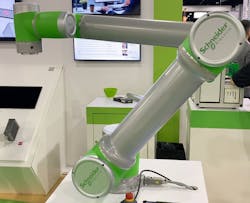Demonstrating the increasing interest across industry in deploying robotic systems to automate production processes, Schneider Electric is entering the collaborative robot market with its new Lexium cobot line. These new cobots add to Schneider Electric’s existing line of Lexium multi-axis robotic systems and delta robots.
At Modex 2024, the company showcased this new cobot line with demonstrations of its Lexium RL 3 and RL 18 models as well as information about the forthcoming RL 5 and RL 7 models. The numbers in the cobot’s names indicate the payload capacity, in kilograms, for each cobot.
A key aspect of Schneider Electric’s approach is to not only offer cobot technology on its own, but to highlight the pre-configured integration of these robots with the company’s EcoStruxure architecture which enables collaborative data flow across the enterprise by connecting smart devices, robots, controls, software and services. This integration of cobots and enterprise data is possible via the cobots’ Modicon motion controllers, which unify system control, motion and robotics control functionality on a single hardware platform that’s integrated with EcoStruxure Machine Expert software.
For OEM’s looking to integrate cobots into machinery, Christine Bush, machine solutions manager at Schneider Electric, said the company will soon introduce its MiniCab, which is “a controller without the power supply instead of the traditional larger robot control cabinet. This is perfect for OEM's looking to have one control cabinet where they already have power distribution to work with our cobots on their machine.”
The cobots are also compatible with Schneider Electric’s EcoStruxure Machine Expert Twin, a digital twin software suite that creates digital models of machines, allows for virtual test strategies and commissioning, as well as factory acceptance testing (FAT).
According to Schneider Electric, digitizing these common processes can reduce time-to-market by up to 50% and commissioning time by up to 60%. A further 20-40% savings in investment costs can also be realized due to faster time-to-market.
Additional benefits of Lexium cobots, according to Schneider Electric, include:
- Fast deployment via the cobots’ use of open automation standards and protocols that provide for flexibility, scalability and third-party equipment integration across varied industry vertical applications.
- The cobots range from 3 kg to 18 kg payload capacities and feature accurate joint servo control and high positioning accuracy.
- The Lexium cobots are designed to perform well in harsh environments and can handle riskier operator tasks involving heavy weights to reduce worker accidents and injuries.
In the video below, Schneider Electric’s Christine Bush explains the new Lexium line of cobots.
Leaders relevant to this article:


